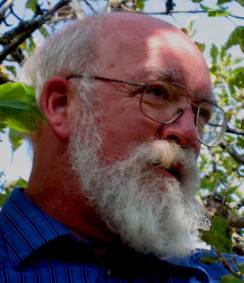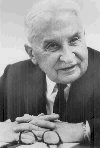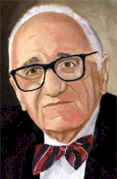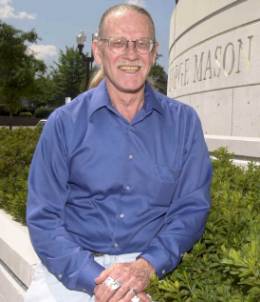![]()
Mises Without Embarrassment![]()
by Bob Layson
When this philosophy student eventually encountered the writings of Ayn Rand, circa 1977, he was immune to her, how should it be put, banalysis of the central problems of philosophy and her Mr Toad like dismissal of ‘those gentlemen up at Oxford'. Indeed, I felt rather embarrassed on her behalf. Rather as one feels when watching someone in a karaoke bar putting on a great show and never hitting a note in the middle. With Mises the experience was quite different. Admittedly, his claims for the ‘apodeictic certainty' and empirical content of a priori reasoning in economics seemed so much to run full tilt into the arguments of Hume that – even with the aid of Kantian philosophy, neo and otherwise – he seemed certain only to choke on what he had bitten off. Nevertheless, the house that von Mises built struck me as an imposing one with or without its so-called foundations. I even had a suspicion that what Mises regarded as truths synthetic, empiric and a priori would prove more palatable to philosophers and others if taken to be analytic, tautological and, in all practice, indispensable.
Some seven or so years later I read Daniel C Dennett on belief ( The Intentional Stance) and my suspicion was confirmed by way of exemplary arguments from a top philosopher. My own thoughts on the subject had the merit of brevity and originality but I could not deny that Dennett had actually done the job and had got his originality in first. Dennett is a professional academic philosopher and his writings on
the imputation of belief and desire are in no way intended as an apology for Misean a priorism . He does not mention Mises and may not have even heard of him. Yet to someone who thinks that Mises is well worth saving from the Miseans, the parallels are obvious.
Here then is what can be taken from Dennett's philosophy and used to transform the analysis of Mises into something far less maverick and much closer to the truth of the matter.

Daniel C. Dennett
What Mises declares to be a set of a priori truths Dennett views as parts of a systematic approach to understanding human behaviour as rational agency or, as Dennett terms it, adopting the intentional stance. The fact that humans seem to be hard-wired by evolution to take the intentional stance both toward themselves and others and would perish without it does nothing to justify a neo-Kantian interpretation since, in thought at
least, we can readily escape this stance and to understand, predict and retrodict human behaviour as that of purely physical or chemical processes. As Dennett points out, with most of the physical sciences there is either no room for or nothing to be gained from looking for a motive to act or even an evolutionary function being performed. With the social sciences the position is reversed and physics and chemistry are of very little use whilst analysis in terms of agency is practically indispensable.
When it comes to understanding one another and predicting likely human behaviour in types of recurring situations the only place for physics is to serve to limit the scope of likely outcomes and, therefore, the range of correct explanations. For example, if a man is confronted by a problem we expect him to use known practical ways of solving it. We do not suppose that natural laws will be suspended so that he need only make a wish or call upon his creator for the end to be achieved.
In explaining a past event such as a particular theft we do not need consider a potential suspect's ability to levitate, walk through walls or create a doppelganger at will. In brief, we work on the basis that if something is humanly or logically impossible then it will not be done or have been done. Beyond that, save for the science in forensic science, we rely on what is often called ‘folk psychology'. Who had the means, motive and opportunity?
According to Dennett, in predicting the behaviour of various systems such as rocks, clocks, plants, animals and humans we can use the physical stance, the design stance or the intentional stance.
Physical Stance: ‘determine its physical constitution (perhaps all the way down to the microphysical level) and the physical nature of the impingements upon it, and use your knowledge of the laws of physics to predict the outcome for any input'.
Design Stance: ‘one ignores the actual (possibly messy) details of the physical constitution of an object, and, on the assumption that it has a certain design, predicts that it will behave as it is designed to behave under various circumstances.'
Intentional Stance: ‘first you decide to treat the object whose behaviour is to be predicted as a rational agent; then you figure out what beliefs the agent ought to have, given its place in the world and its purpose. Then you figure out what desires it ought to have, on the same considerations, and finally you predict that this agent will act to further its goals in the light of its beliefs. A little practical reasoning from the chosen set of beliefs and desires will in many - but not all – instances yield a decision about what the agent ought to do; that is what you predict the agent will do.'
What Dennett says is plainly correct and, in a way, already familiar to us. We cannot and therefore do not predict the action of, say, a man driving a car by using the methods of an astronomer predicting a lunar eclipse or even an engineer predicting the performance of an engine. Yet by treating every car driver as a rational agent using a means to an end and constrained by common and known rules, laws, ethical norms and common prudence we can readily predict the behaviour of other drivers.
As far as I can see, Dennett does not expect that this so-called ‘folk psychology' to eventually give way to a superior science, as has happened in the case of medicine for example, because explanation in terms of rational agency does not make the sort of ontological claims that sciences must make. To correctly impute beliefs and desires to an agent does not require that one have a correct philosophy of mind or science of the psyche. Imputation does not require any physical examination of the agent's body or any proven identification of beliefs and desires, as mental states, with particular states of mind-stuff or physical brain processes. We will always see people as desire driven and belief guided even if no physical correlate of particular desires or beliefs is ever discovered in any particular brain. The terms ‘desire' and ‘belief' may cease to be the labels of choice but the self-same job will simply be done by other words as the core conceptions are retained.
In my view (I make no claim regarding Dennett) the analysis of human behaviour in terms of rational agency is so little a matter of utilising scientific or pre-scientific hypotheses as to be not even hypothetical. Empirical conjecture only arrives when the conceptual schema that comprises the intentional stance is actually employed: ‘That is a conscious agent and, as such, engaged in purposeful activity.' If, in any instance, some behaviour cannot be made the slightest sense of, then the interpretive schema is not to be faulted so much as the knowledge and imagination of the interpreter. For if there is a purpose to be found then the interpreter has yet to find it and if there is no purpose to be found then the interpretive schema cannot be faulted for not finding it. It may not even be a mistake to try as the attempt to make sense in terms of agency is an effective filter for separating the busy scene before us into stage, props and actors. Otherwise, the claim fails because what was taken to be an instance of a type, the free and conscious agent, is actually a mere coming together of appearances sufficient to give the impression of life and purpose. For example, the corner of a building may look just like the profile of a waiting gunman and, momentarily, be taken for such.
The Miseans are right to point out that we do not learn from experience that, given the choice, people choose according to their preference and choose what they most prefer. No mere accumulation of observations could suggest the axiom or prove it either true or false. The Miseans are wrong, however, to conclude that if this piece of knowledge is not acquired from experience a posteriori then it must be innate and a priori or, at least, logically spun out of what is.
The logic of action explanation requires only, or need require no more, than that the terms employed have a meaning whose correct grasp is revealed in their successful application. They are not so much knowledge as a means to understanding, a means to knowing – of knowing what someone is about. Terms of art like, 'means, end, purpose, intention, want, deliberate, perceive, conclude, preference, freely choose, believe and desire' and many more variants of these are cashed out in terms of one another according to parts played by the conceptions that are picked out by them. Just as in spacial terms we learn what it means for there to be one thing ‘between' two other things and two things ‘each side of' some other thing. To know that no dead or inanimate thing can be an agent or that to choose requires a range of options is to reveal practical competence and linguistic ability rather than prior knowledge of the world.
As children we learn what various things are for and who uses them and what they are doing when they do: ‘The builder uses mortar to bond the bricks that together go to make a wall. The wall supports the roof of the house. And the house is for people to live in'. In turn familiarity breeds competence and we can usually see what most people are about or up to simply by noting what means they are employing. Sometimes, even as adults, we are uncertain and have to ask directly what something is ‘in aid of' or what someone is ‘up to' and the answer, or at least the response, usually allows sense to be made of the behaviour as an instance of, say, ritual observance, joking, playing games, acting, illness and etc. For despite what some philosophers would say, most of us most of the time are engaged in activities paralleled, in some form, in all societies and therefore not inexplicable to intelligent outsiders with time to inquire further.
To be an agent is to be understandable according to the logic of agency. Human agents both understand themselves and other humans by this system of analysis long before they even come near to such unsettled philosophical questions as whether beliefs and desires are physically instantiated or whether they can be part of a natural-law cause and effect explanation which proceeds from initial conditions to conditions at time t plus.
This puff for the works of Dennett, and the chapter ‘True Believers' from The Intentional Stance in particular, is not intended as a thoroughgoing review or even an attempt to give the bare bones of his ongoing project. It is here intended to give notice that Misean economics need not be taken at its own estimation as a thing of all or nothing and that much which repels other economists can both be rendered inoffensive and revealed to be the indispensable, if only implicitly acknowledged, conceptual background to all economics that proceeds and returns to the autonomous human agent acting in time and inevitable ignorance and guided by a set of expectations only partly shared by other agents. So-called folk psychology enables us to do a surprisingly good job of predicting the actions of other agents and the consequences and likely systematic reactions of other agents both within and without a market order. And folk psychology plus the work of good economists such as Mises takes us even further.
Completely successful prediction is a practical impossibility but complete micro-economic explanation is always possible, in theory, if we know enough about the agents and the agents maintain their rationality throughout the period of activity to be explained. Not that the rationality constraint need be at all constraining. Indeed, and this is the author speaking and not Dennett, if the ‘rational' in ‘rational agency' is considered to be something that no two reasonable philosophers can agree on then it may be dropped and the more primitive idea of agency left to do the work. Agency would then be a matter of persons and their reasons. The persons can be as multi-personed as may be or split every which way. The reasons may not seem good enough to the agent after the event or to anybody else before the event but, in the event, the mind is sufficiently made up to act. And in case where neither the agent nor anyone else can see a reason for the behaviour then the agent can call it a mistake an accident and any third parties may call it accident, pretence or madness.
It is not, therefore, a matter of irrefragable knowledge that humans are agents, so much as a prejudice that we have no good reason to dispense with. So strong and humanly natural is this prejudice that even many theories of mental illness see the patient as an end seeking and means employing quasi-rational agent whose beliefs and desires are either erroneous or not consciously acknowledged.
‘Folk psychology might best be viewed as a rationalistic calculus or interpretation and prediction – an idealising, abstract, instrumentalistic method that has evolved because it works and works because we have evolved.'
Dennett is regularly accused of not really believing in belief yet he says he holds beliefs to be as real as centres of gravity or the line of the equator. This does not reassure all parties. Yet Dennett in his writings alone is plainly acting as one who believes in other believers – he truly does. This plainly will not do for those who maintain that we know beliefs and desires exist and effect change in, at least, our own behaviour by turning our inner eye towards the theatre of our own mind and seeing them sport and play like so many dolphins in a tank. This in turn leaves Dennett unimpressed as he famously has no time for the Cartesian Theatre and insists that it is not the only show in town. My own view is that the common view of so-called ‘simple reports of introspection' is a complex of old philosophy and currently available language. We can think of nothing better to say in the circumstances. But Dennett can. See especially his Consciousness Explained .
In fact, see and read as many of Dennett's books as possible. His Darwin's Dangerous Idea is a mighty piece of work and leaves one concluding that, so far from the idea of spirit explaining the movement of human bodies - and a Great Spirit explaining the movement of heavenly bodies, inanimate bodies and the creation of all bodies - spiritedness or mindfulness is something that is necessarily secondary and could only arise from the coming together and evolution of what is utterly without spirit or mind. So much for God.
Here I leave Dennett and pass on to drawing the moral for those unbending and staunch defenders of the Misean fortress and the true foundations of economics. And if my outline of Dennett on the Intentional Stance seems sketchy and lacking in the full arsenal of philosophical pro and con that is because I am attempting no more than to draw attention to the mother lode and tell those drawn to the prospect where to dig.
If when organising a picnic for six I pack a dozen apples that are to be apportioned equally, I conclude with no lack of certainty of whatever variety, each picnic goer will receive two apples. I use arithmetical analysis to reach a practical conclusion but no a priori knowledge of real world events or processes is thereby implied. The same holds for situational logic, praxeology or the Intentional Stance: if dealing with a known individual agent who desires x (as a matter of revealed preference) and believes P (as a matter of revealed propositional attitude) then expect that the agent will attempt, or have attempted, if circumstances allow to---.
Consider another example. Suppose two robots (one an advance until blocked then reverse and turn left when possible type and the other an advance until blocked then reverse and turn right when possible type) are set the task of escaping from a simple maze designed to allow only the first sort to escape. Which robot will escape, the first or the second? Why a sufficiently bright five-year-old child could tell. As with robots, then so with us. Different consumers or different producers are understood no differently in micro-economic analysis: if these sorts of consumers with those types of expectations and perceptions are offered that variety of goods priced thuswise then---.
The analysis cannot be faulted and leads to certain knowledge of how particular kinds of agents would act. The uncertainty and ignorance enter when actual agents must be judged and categorised. And when it comes to wholesale predictions about the systematic ramifications of the actions of actual agents, say with regard to particular stock prices in a year's time, then the certain knowledge that rational agents actions are fully explicable in terms of rational agency, in principle, is of little practical use.

Ludwig von Mises
This is not news to those of the Austrian school. Despite bulldog appearance and, at times, utterance Mises himself was very modest about what praxeology could do. Or rather, within its kingdom it could not be bested. But without, the world was full of historians of the recent past and forecasters of the near future posing as economists.
Mises was right to doubt the postitive value of the postitive economists. He was right to suspect that mathematically minded economists might deform the subject itself by simplifying it sufficiently to allow ostentatious displays of mathematical analysis by mathematicians shut out of the Maths Department.
The important thing, speaking for myself as a libertarian activist, is that the work of economists should, at least, help the public to understand the systematically beneficial consequences of individual thought and action taken by people with their property – and the property to which the have acquired access -within the norms, laws and institutions that make a commercial society, and to contrast such conditions within a free economy with those inevitably arising when widespread state intervention is practised. I want the public to know as much economics as will lead them to demand more private initiative and less politics. And from such a project of public enlightenment, mathematical modelling by academic economists too frequently detracts attention even as it gathers state funding for looking so scientific. I do not hold that state employed economists should not be free to follow the arguments wherever they go and to employ whatever methods seem best suited to the subject. I merely hold that tax funded economists should not exist.

Murray Rothbard
In truth, actually existing economics is for the most part not a market phenomenon and, not surprisingly, forms not so much a pool of knowledge as an unsellable sump of model run-off. Yet Miseans such as Rothbard are wrong to condemn the empirical economists for not being able to prove their hypotheses. Karl Popper has shown that no hypothesis or conjecture as to what is the actual law governing particular empirical phenomena can be proved – only tested and, perhaps, thereby disproved or refuted. But if no general hypothesis can be a known to have been proved a true hypothesis then a fortiori something which is not a hypothesis has even less chance of being such a wonder. For, to repeat myself, praxeology uses neither axiom nor hypothesis for agent analysis is just so much analysis and applies to sorts of agents in types of circumstance no matter how the agents are physically instantiated in the possible universe they inhabit.

Nobel Laureate Vernon Smith
![]()
Further reading

Human Action: A Treatise on Economics
Von Mises, Ludwig "A Libertarian Classic "
You can buy this book secondhand from Abe Books including a number of booksellers.
Abe Books: Human Action Price List

Omnipotent Government
Von Mises, Ludwig "Written in 1944, this is a ferocious critique of the rise of the Total State and Total War. "
Abebooks
PDF version
of this page
![]()
Mises.pdf
Download
Requires Adobe
Acrobat Reader. This is
available
for free at
www.adobe.com
and on many free CDs.

The Alternative
Bookshop
Which specialises in,
but does not limit itself
to, books on Liberty
and Freedom ... Book
reviews, links,
bestsellers, rareties,
second— hand,
best price on books,
find rare books.

Laissez Faire
Books
The World's Largest
Selection of Books on
Liberty
|
|
|
It is not, therefore, a matter of irrefragable knowledge that humans are agents, so much as a prejudice that we have no good reason to dispense with. So strong and humanly natural is this prejudice that even many theories of mental illness see the patient as an end seeking and means employing quasi-rational agent whose beliefs and desires are either erroneous or not consciously acknowledged.
|
This is not news to those of the Austrian school. Despite bulldog appearance and, at times, utterance Mises himself was very modest about what praxeology could do. Or rather, within its kingdom it could not be bested. But without, the world was full of historians of the recent past and forecasters of the near future posing as economists.
|
|